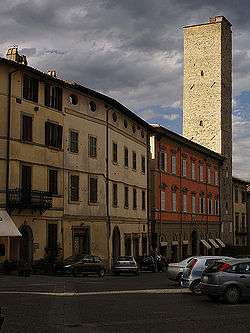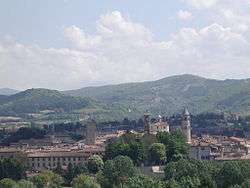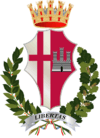Città di Castello
| Città di Castello | ||
|---|---|---|
| Comune | ||
| Comune di Città di Castello | ||
|
Panoramic view | ||
| ||
.svg.png) Città di Castello within the Province of Perugia | ||
 Città di Castello Location of Città di Castello in Italy | ||
| Coordinates: 43°27′39″N 12°14′38″E / 43.46083°N 12.24389°ECoordinates: 43°27′39″N 12°14′38″E / 43.46083°N 12.24389°E | ||
| Country | Italy | |
| Region | Umbria | |
| Province / Metropolitan city | Perugia (PG) | |
| Frazioni | see list | |
| Government | ||
| • Mayor | Luciano Bacchetta (PSI) | |
| Area | ||
| • Total | 387.53 km2 (149.63 sq mi) | |
| Elevation | 288 m (945 ft) | |
| Population (30 April 2010) | ||
| • Total | 40,479 | |
| • Density | 100/km2 (270/sq mi) | |
| Demonym(s) | Tifernati or Castellani | |
| Time zone | CET (UTC+1) | |
| • Summer (DST) | CEST (UTC+2) | |
| Postal code | 06010, 06011, 06012, 06018 | |
| Dialing code | 075 | |
| Patron saint | Saint Florido | |
| Saint day | 13 November | |
| Website | Official website | |

Città di Castello (Italian pronunciation: [tʃitˈta ddi kaˈstɛllo]) is a city and comune in the province of Perugia, in the northern part of the Umbria region of Italy.[1] It is situated on a slope of the Apennines, on the flood plain of the river Tiber. The city is 56 km (35 mi) north of Perugia and 104 km (65 mi) south of Cesena on the S3bis. It is connected to the A1 highway by the SS 73 from Arezzo (17 mi). Città di Castello has an exclave named Monte Ruperto within Marche.
History
The town was founded by the Umbri tribes. The Romans knew it as Tifernum Tiberinum ("Tifernum on the Tiber")[2] or Civitas Tiberina. Just nearby, Pliny the Younger built his villa in Tuscis, which is identified with walls, mosaic floors and marble fragments surviving at a place now called Colle Plinio, the "Hill of Pliny". The town may have come into conflict with the Etruscans.[3]
In 550 AD, Tifernum was largely destroyed during the Ostrogothic campaign by Fantalogus, at the orders of Totila. The town was subsequently rebuilt by its bishop, Floridus, around a castle, and renamed first Castrum Felicitatis and later Civitas Castelli. By the Donation of Pepin of the Frankish king Pepin the Short in 752, it went to the Holy See. After this it became free common.
In subsequent centuries, it had various rulers, among them Pier Saccone Tarlati di Pietramala, brother of Guido, Bishop of Arezzo. Pier Saccone sold it in 1322 to Guido Alberto de' Guidi di Modigliana.In Middle Ages the Diocese of Citta' di Castello included also many territories that are today in the provinces of Arezzo, Pesaro and Rimini. In the later Middle Ages it was governed successively by the Guelphs and Ghibellines. In 1375, Città di Castello joined the insurrection of other cities of the States of the Church. Cardinal Robert of Geneva (later antipope as Clement VII), tried to capture it using Breton mercenaries, but was repulsed. Under Pope Martin V in 1420, it was taken by the condottiero Braccio da Montone. Later Niccolò Vitelli, aided by Florence and Milan, became absolute ruler or tiranno. Antonio da Sangallo the Younger built an extensive palace for the Vitelli family.
In 1474, Sixtus IV sent his nephew, Cardinal Giuliano della Rovere (later Julius II); after fruitless negotiations he laid siege to the city, but Vitelli did not surrender until he learned that the command of the army had been given to Duke Federico III da Montefeltro. The following year Vitelli tried unsuccessfully to recapture the city; fear of Cesare Borgia induced him to desist, since Cesare Borgia had had Vitelli's father strangled and Città di Castello added to the papal possessions.
On 11/09/1860 Citta' di Castello was occupied by piedmontese troops.On 17/03/1861 it became part of the Kingdom of Italy.
Towards the end of the twentieth century, the city has seen a considerable expansion northwards toward San Giustino, with industrial parks tracking the river, railroad and main highway: the area produces farm machinery, textiles, ceramics and furnishings.
Geography
Overview
The town is located in northern Umbria, at the borders with Tuscany and Marche, and is crossed by the Tiber river. The municipality borders with Apecchio (PU), Arezzo (AR), Citerna, Cortona (AR), Mercatello sul Metauro (PU), Monte Santa Maria Tiberina, Monterchi (AR), Montone, Pietralunga, San Giustino, Sansepolcro (AR), Sant'Angelo in Vado (PU) and Umbertide.[4]
Frazioni
Antirata, Astucci, Badia Petroia, Badiali, Barzotti, Baucca, Belvedere, Bisacchi, Bonsciano, Caifirenze, Candeggio, Canoscio, Capitana, Celle, Cerbara, Cinquemiglia, Colcello, Coldipozzo, Cornetto, Croce di Castiglione, Fabrecce, Fiume, Fraccano, Grumale, Lerchi, Lugnano, Madonna di Canoscio, Marchigliano, Montemaggiore, Monte Ruperto, Morra, Muccignano, Nuvole, Palazzone, Petrelle, Pettinari, Piosina, Promano, Riosecco, Roccagnano, Ronti, Rovigliano, San Biagio del Cornetto, San Leo Bastia, San Lorenzo Bibbiana, San Maiano, San Martin Pereto, San Martino di Castelvecchio, San Martino d'Upò, San Pietro a Monte, San Secondo, Santa Lucia, Scalocchio, Seripole, Terme di Fontecchio, Titta, Trestina, Uppiano, Userna, Userna Bassa, Valdipetrina, Vallurbana, Vingone, Volterrano.
Main sights
The city is mostly built of brick, since the local sandstone erodes very rapidly. Its principal monuments include the medieval Palazzo Comunale and a tall thin tower, the Torre Comunale; and the Pinacoteca Comunale, an art museum with mostly Renaissance works, notable for its external decoration by Giorgio Vasari.
The much reworked cathedral, now mostly from the 18th century with an unfinished 17th century façade, has an altar-front (paliotto) of chased silver dating to the 12th century, and a crosier from the 15th. It also houses works by Niccolò Circignani, Rosso Fiorentino and Raffaellino del Colle. The bell tower is in Romanesque style (13th century). The Cathedral's museum is home to the Canoscio hoard, a set of Late Antique silver spoons and plates with Christian motifs, as well as a silvered altarpiece donated by Pope Celestine V in the 12th century, a Madonna by Pinturicchio (1486) and Angels by Giulio Romano.
The city has memorialized the abstract painter and sculptor Alberto Burri, who was born in Città di Castello, with the "Fondazione Palazzo Albizzini Collezione Burri" housing a large permanent museum of his works in the former Palazzo Albizzini.
Famous inhabitants
For persons from the city, see People from Città di Castello. In addition, the following are believed to have had a local connection, usually through long residence there:
- Pliny the Younger
- Pope Celestine II
- Monica Bellucci
- Vitellozzo Vitelli
- Alberto Burri
- Salvatore Sciarrino
Twin towns
 Joué-lès-Tours, France, since 1991
Joué-lès-Tours, France, since 1991 Sighișoara, Romania
Sighișoara, Romania
See also
References
Notes
- ↑
 Chisholm, Hugh, ed. (1911). "Città di Castello". Encyclopædia Britannica. 6 (11th ed.). Cambridge University Press. p. 399.
Chisholm, Hugh, ed. (1911). "Città di Castello". Encyclopædia Britannica. 6 (11th ed.). Cambridge University Press. p. 399. - ↑ The name distinguished it from Tifernum Mataurense and Tifernum on the Sannio. (Guida d'Italia)
- ↑ Pliny the Elder, Book III, chap. 19, paragraphs 112-113. Also at wikisource latina
- ↑ 42407 Città di Castello on OpenStreetMap
Sources
- YouTube.com
 This article incorporates text from a publication now in the public domain: Herbermann, Charles, ed. (1913). "Diocese of Città di Castello". Catholic Encyclopedia. New York: Robert Appleton. Newadvent.org
This article incorporates text from a publication now in the public domain: Herbermann, Charles, ed. (1913). "Diocese of Città di Castello". Catholic Encyclopedia. New York: Robert Appleton. Newadvent.org- Touring Club Italiano, 1966. Guida d'Italia: Umbria pp136–42
- Official homepage (in Italian) (in English)
- Bill Thayer's site
External links
| Wikimedia Commons has media related to Città di Castello. |
- (Italian) Città di Castello official website
- (Italian) Città di Castello on luoghimisteriosi.it

